به رسمیت شناخته شدن دولت فلسطین
به رسمیت شناخته شدن دولت فلسطین پس از آن رویداد که اعضای سازمان آزادیبخش فلسطین در جلسه فوقالعاده ۱۸ نوامبر ۱۹۸۸ در الجزیره پایتخت کشور الجزایر با انتشار بیانیه استقلال فلسطین تشکیل دولت فلسطین را اعلام کردند. انتشار این بیانیه به سرعت از سوی طیف وسیعی از کشورها مورد استقبال قرار گرفت[1] و تا پایان آن سال ۸۰ کشور، دولت فلسطین را به رسمیت شناختند.[2] در فوریه ۱۹۸۹ نماینده سازمان آزادیبخش فلسطین در شورای امنیت سازمان ملل متحد ادعا کرد که ۹۴ کشور، دولت فلسطین را به رسمیت شناختهاند. به عنوان بخشی از تلاشها برای پایان دادن به نزاع اسرائیل و فلسطین و در پی امضای پیمان اسلو میان اسرائیل و سازمان آزادیبخش فلسطین، حکومت خودگردان فلسطین به عنوان یک دولت موقت و خودگردان در سرزمینهای فلسطین نشین آغاز به کار کرد. اسرائیل اعلام کرد دولت فلسطین را به عنوان یک دولت مستقل به رسمیت نمیشناسد و کنترل سرزمینهای تحت سلطه حکومت خودگردان را در اختیار خواهد داشت.
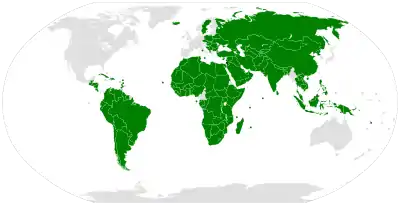
بسیاری از کشورهایی که دولت فلسطین را به رسمیت نمیشناختند، سازمان آزادیبخش فلسطین را نماینده مردم فلسطینی میشناختند. در ۲۹ نوامبر ۲۰۱۴ مجمع عمومی سازمان ملل متحد با ۱۳۸ رأی موافق و ۹ رأی مخالف و ۴۱ رأی ممتنع وضعیت فلسطین را به دولت ناظر غیر عضو تغییر داد.[3][4][5][6]
اسرائیل و تعدادی از دیگر کشورها دولت فلسطین را به رسمیت نشناخته و اعلام کردند تأسیس دولت فلسطین تنها از طریق گفتگو و مذاکره بین اسراییل و ساف امکانپذیر است.
مسائل اصلی مانع از حصول توافق در حال حاضر عبارتند از: مرزها، امنیت، حقوق آب، وضعیت بیتالمقدس، آزادی دسترسی نیایشگاهها در اورشلیم، شهرک سازیهای اسرائیل، وضعیت پناهندگان فلسطینی از جمله حق بازگشت.
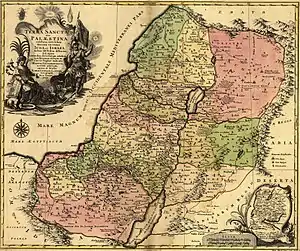
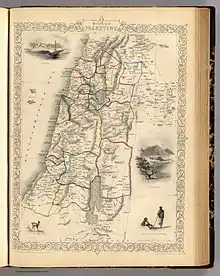
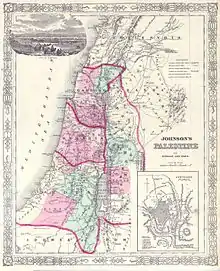
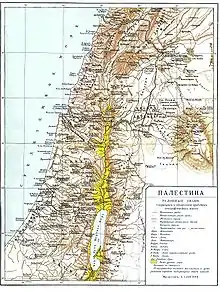
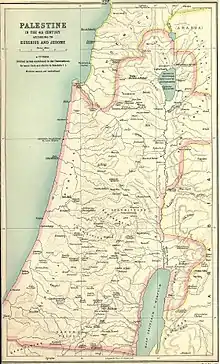
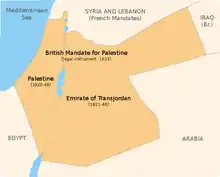
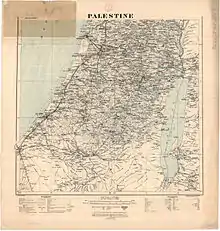
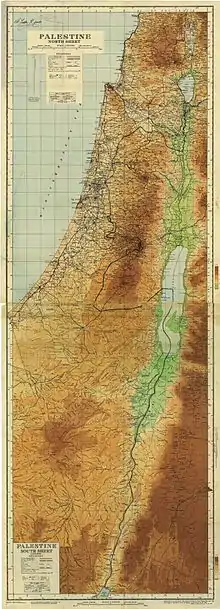
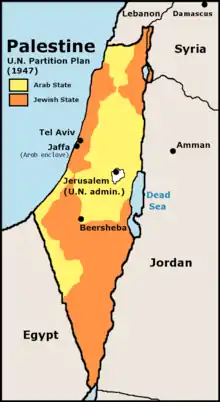
پیشینه
در ۲۲ نوامبر ۱۹۷۴ قطعنامه شماره ۳۲۳۶ مجمع عمومی سازمان ملل حق تعیین سرنوشت، استقلال و حاکمیت در فلسطین را برای فلسطینیان به رسمیت شمرد و همچنین سازمان آزادیبخش فلسطین را به عنوان تنها نماینده مردم آن کشور با عضویت ناظر مجمع عمومی سازمان ملل متحد انتخاب کرد.
مدت کوتاهی پس از بیانیه سال ۱۹۸۸، دولت فلسطین توسط بسیاری از کشورهای در حال توسعه در آفریقا و آسیا و همچنین کشورهای کمونیستی و اعضای جنبش عدم تعهد به رسمیت شناخته شد.[7][8] در آن زمان ایالات متحده آمریکا با استفاده از قانون کمکهای خارجی تلاش نمود که دیگر کشورها و سازمانهای بینالمللی را از به رسمیت شناختن دولت فلسطین دلسرد کند.[9] اگر چه این اقدامات در بسیاری از موارد موفقیتآمیز بود،[10] اتحادیه کشورهای عرب و سازمان همکاری اسلامی بلافاصله با انتشار بیانیههایی ضمن به رسمیت شناختن دولت فلسطین، با هدف حمایت و همبستگی با این کشور، دولت فلسطین را به عضویت هر دو سازمان پذیرفتند.[11][12][13]
در فوریه ۱۹۸۹ و در نشست شورای امنیت سازمان ملل، نماینده سازمان آزادیبخش فلسطین اعلام کرد ۹۴ کشور، دولت فلسطین را به رسمیت شناختهاند.[14][15] با این اقدام، فلسطین تلاش کرد عضویت چند سازمان تخصصی سازمان ملل متحد را به دستآورد که در نهایت آمریکا با تهدیدهایی مبنی بر قطع بودجه سازمانهایی که فلسطین را به عضویت بپذیرند، مانع از به ثمر نشستن تلاشهای فلسطین شد.[16] برای نمونه در آوریل همان سال و پس از آنکه ایالات متحده تهدید کرد اگر عضویت فلسطین در سازمان بهداشت جهانی پذیرفته شود، بودجه سازمان بهداشت جهانی را قطع خواهد کرد، درخواست عضویت فلسطین در آن سازمان پذیرفته نشد.[17] در ژوئن ۱۹۸۹ سازمان آزادیبخش فلسطین طی نامهای به دولت سوئیس به عنوان متولی کنوانسیون ژنو سال ۱۹۴۹، عضویت در آن کنوانسیون را درخواست کرد ولی دولت سوئیس پاسخ داد، به دلیل آنکه استقلال فلسطین در مجامع بینالمللی، هنوز به رسمیت شناخته نشدهاست، نمیتواند این نامه را درخواستی مناسب برای التحاق به کنوانسیون ژنو بداند.[17] با توجه به آنکه جامعه بینالمللی دربارهٔ وجود یا عدم وجود یک دولت فلسطینی دچار تردید است و تا زمانی که این مسئله در یک چهارچوب مناسب حل نشود، دولت سوئیس به عنوان امین کنوانسیون ژنو و پروتکلهای الحاقی آن، در موقعیتی نیست که بتواند تشخیص دهد که این ارتباطات میتواند سند مناسبی برای التحاق فلسطین به کنوانسیون و پروتکلهای الحاقی آن باشد یا خیر.[18]
در نتیجه، در ماه نوامبر ۱۹۸۹ اتحادیه کشورهای عرب، قطعنامهای را به مجمع عمومی سازمان ملل پیشنهاد داد که براساس آن سازمان آزادیبخش فلسطین بهطور رسمی به عنوان یک دولت مستقل فلسطینی پذیرفته شود.
پس از آنکه ایالات متحده مجدداً کشورهایی که به این قطعنامه رأی دهند را به قطع کمکهای مالی تهدید کرد، پیشنویس این قطعنامه کنار گذاشته شد. کشورهای عربی در مقابل تعهد آمریکا بر عدم تکرار تهدید به تحریم سایر کشورها، پذیرفتند بر تصویب این قطعنامه پافشاری نکنند.[19] بسیاری از به رسمیت شناختنهای اولیه، مبهم و دوپهلو بود.[20] علاوه بر آن، تردید سایر کشورها در به رسمیت نشناختن، الزاماً بدین معنا نبود که آنها دولت فلسطین را معتبر نمیدانند.[17] این موضوع منجر به ایجاد سردرگمی دربارهٔ تعداد کشورهایی شد که در ۱۹۸۸ همزمان با اعلام استقلال، دولت فلسطینی را به رسمیت شناختند. دربارهٔ شمار کشورهایی که درگذشته اعلام کرده بودند دولت فلسطین را به رسمیت میشناسند، اختلاف وجود داشت،[21] با این حال نام ۱۳۰ کشور در میان به رسمیت شناختهها دائماً به چشم میخورد.[10][22] در ژوئیه ۲۰۱۱، ریاض منصور، سفیر فلسطین در سازمان ملل متحد، در مصاحبه با روزنامه اسرائیلی هاآرتص ادعا کرد که ۱۲۲ کشور، دولت فلسطین را به رسمیت میشناسند.[23] در پایان همان ماه ساف مقالهای دربارهٔ «چرایی لزوم به رسمیت شناخته شدن فلسطین از سوی دیگر دولتها» منتشر کرد و در آن مقاله فهرست ۱۲۲ کشوری را اعلام کرد که دولت فلسطین را به رسمیت شناختهاند![24]در پایان سپتامبر همان سال، ریاض منصور ادعا کرد، تعداد این کشورها به ۱۳۹ کشور رسیدهاست.[25]
موضع اسرائیل
در فاصله میان جنگ ششروزه و پیمان اسلو، دولت اسرائیل پیشنهاد تشکیل یک دولت فلسطینی را ارائه کرد. حتی پس از تأسیس حکومت فلسطین در ۱۹۹۴، بسیاری از جریانهای سیاسی اسرائیل با پیشنهاد تشکیل دولت فلسطین مخالفت کردند. بنیامین نتانیاهو در طول دوره نخستوزیری خود تا آنجا پیش رفت که دو نخستوزیر سابق، یعنی اسحاق رابین و شیمون پرز را به نزدیک کردن آنچه او خطر تأسیس دولت فلسطین مینامید، متهم کرد. نتانیاهو اعلام کرد هدف اصلی سیاستهای دولت او ممانعت از تبدیل حکومت فلسطین به دولت مستقل فلسطینی است.[26] سیاستهای دولت نتانیاهو پس از مدتی تغییر کرد و او تحت فشار باراک اوباما در سخنرانی ۴ ژوئن ۲۰۰۹ گفت: او ایده تأسیس یک دولت خلع سلاح شده فلسطینی در سرزمینی محدود را تأیید میکند.[27] این موضعگیری نتانیاهو به دلیل عدم وجود تضمینهایی برای بازپس دادن سرزمینهای فلسطینی در آینده، مورد انتقادهایی واقع شد.
در دسامبر ۲۰۰۱ آریل شارون، اولین نخستوزیری بود که تشکیل دولت فلسطین را تنها راه حل پایان دادن به نزاع اسرائیل-فلسطین دانست و تحقق بخشیدن به این کار را یکی از اهداف دولت خود برشمرد. دولت ایهود اولمرت نیز با تکرار این موضوع، بر آن صحه گذاشت، لیکن با روی کار آمدن دولت نتانیاهو، بار دیگر اعلام شد که تشکیل دولت فلسطین خطری برای اسرائیل بهشمار میآید.[26]
دولت اسرائیل بهطور کلی ایده تأسیس دولت فلسطین را پذیرفتهاست، اما از پذیرش مرزهای سال ۱۹۶۷ به عنوان یکی از شروط مذاکرات مرز نهایی را به دلیل نگرانیهای امنیتی خودداری کردهاست. کارشناسان نظامی اسرائیل استدلال کردهاند که مرزهای سال ۱۹۶۷ از منظر استراتژیک غیرقابل دفاع هستند.[28] اسرائیل همچنین مخالف مطرح شدن موضوع استقلال فلسطین در مجمع عمومی سازمان ملل است و معتقد است که طبق پیمان اسلو هر گونه فعالیت یکجانبه در این موضوع امری نکوهیدهاست.[29]
فلسطین در سازمان ملل
در ۱۴ اکتبر ۱۹۷۴ سازمان آزادیبخش فلسطین به عنوان نماینده مردم فلسطینی، از سوی مجمع عمومی سازمان ملل متحد به رسمیت شناخته شد و حق حضور و شرکت در جلسات عمومی آن مجمع که دربارهٔ فلسطین برگزار میشوند را به دستآورد.[30][31]
در ۲۲ نوامبر ۱۹۷۴، وضعیت عضویت ساف به «ناظر غیر دولت» تغییر کرد و این سازمان اجازه یافت در همه جلسات مجمع عمومی و دیگر فعالیتهای سازمان ملل متحد شرکت کند[32]
در ۱۵ دسامبر ۱۹۸۸ و بر اساس قطعنامه ۴۳/۱۷۷ مجمع عمومی سازمان ملل بیانیه استقلال فلسطین به رسمیت شناخته شده و در سازمان ملل نام فلسطین جایگزین نام سازمان آزادیبخش فلسطین شد.[33]
در ۲۳ سپتامبر ۲۰۱۳ محمود عباس رئیس تشکیلات خودگردان فلسطین، به نمایندگی از سازمان آزادیبخش فلسطین، درخواست عضویت آن کشور را به سازمان ملل متحد تقدیم کرد. در ۲۹ نوامبر ۲۰۱۲ و طی قطعنامه شماره ۶۷/۱۹، فلسطین به عنوان «دولت ناظر غیر عضو» در آن مجمع پذیرفته شد و در ۱۷ دسامبر همان سال «یوکیول یون» مدیر پروتکلهای سازمان ملل مقرر کرد که استفاده از نام دولت فلسطین در تمامی اسناد رسمی سازمان ملل الزامی است.[34]
درخواست عضویت در سازمان ملل ۲۰۱۱
دو سال پس از به بنبست رسیدن مذاکرات صلح میان فلسطین و اسرائیل، فلسطینیها تلاشهای دیپلماتیک خود را برای به رسمیت شناخته شدن دولت فلسطین با مرکزیت بیتالمقدس شرقی و با مرزهای پیش از جنگ ششروزه آغاز کردند.[35] تلاشهای فلسطینیها از اواخر ۲۰۰۹ آغاز شد و پس از آنکه محمود عباس درخواست عضویت فلسطین را به سازمان ملل را تقدیم کرد، با استقبال گسترده مواجه شد. این به رسمیت شناخته شدن گسترده میتواند حق اقامه دعوی در محاکم بینالمللی علیه سایر دولتها را برای دولت فلسطین ایجاد کند.[36][37]
به رسمیت شناختنهای دیپلماتیک
- اعضای سازمان ملل متحد
۱۳۴ عضو سازمان ملل متحد که نزدیک به ۵٫۵ میلیارد شخص، معادل ۸۰٪ جمعیت جهان را در خود جای میدهند، دولت فلسطین را به رسمیت میشناسند.[38] فهرست ذیل توسط سازمان آزادیبخش فلسطین و در کوران کمپین انتخاباتی برای به رسمیت شناخته شدن فلسطین در سازمان ملل متحد تهیه شدهاست.[24]
کشورهایی که با علامت (*) مشخص شدهاند، دولت فلسطین را در چهارچوب مرزهای قبل از جنگ ششروزه در ۴ ژوئن ۱۹۷۴ و در محدوده کرانه باختری رود اردن، نوار غزه و بیتالمقدس شرقی به رسمیت میشناسند.
| # | نام[39] | تاریخ به رسمیت شناختن | روابط دیپلماتیک [note 1] | عضویت، اطلاعات بیشتر |
|---|---|---|---|---|
| ۱ | ۱۵ نوامبر ۱۹۸۸[2] | بله[40] | اتحادیه کشورهای عرب OIC; Algeria–Palestine relations | |
| ۲ | ۱۵ نوامبر ۱۹۸۸[2] | بله[41] | اتحادیه کشورهای عرب OIC | |
| ۳ | ۱۵ نوامبر ۱۹۸۸[2] | بله | اتحادیه کشورهای عرب OIC; Iraq–Palestine relations | |
| ۴ | ۱۵ نوامبر ۱۹۸۸[2] | بله[42] | اتحادیه کشورهای عرب OIC[43] | |
| ۵ | ۱۵ نوامبر ۱۹۸۸[2] | بله | اتحادیه کشورهای عرب OIC | |
| ۶ | ۱۵ نوامبر ۱۹۸۸[2] | بله | OIC; Malaysia–Palestine relations | |
| ۷ | ۱۵ نوامبر ۱۹۸۸[2] | بله | اتحادیه کشورهای عرب OIC | |
| ۸ | ۱۵ نوامبر ۱۹۸۸[2] | بله | اتحادیه کشورهای عرب OIC[44][45] | |
| ۹ | ۱۵ نوامبر ۱۹۸۸[2] | بله | اتحادیه کشورهای عرب OIC | |
| ۱۰ | ۱۵ نوامبر ۱۹۸۸[2] | بله[46] | اتحادیه کشورهای عرب OIC | |
| ۱۱ | ۱۵ نوامبر ۱۹۸۸[2] | بله[47] | OIC; Palestine–Turkey relations | |
| ۱۲ | ۱۵ نوامبر ۱۹۸۸[2] | بله | اتحادیه کشورهای عرب OIC
اطلاعات بیشتر
Recognition extended by both یمن جنوبی and the جمهوری عربی یمن، prior to Yemeni unification. In a joint letter to the دبیرکل سازمان ملل متحد sent just prior to unification, the Ministers of Foreign affairs of North and South Yemen stated that "All treaties and agreements concluded between either the Yemen Arab Republic or the People's Democratic Republic of Yemen and other States and international organizations in accordance with international law which are in force on 22 May 1990 will remain in effect, and international relations existing on 22 May 1990 between the People's Democratic Republic of Yemen and the Yemen Arab Republic and other States will continue."[48] | |
| ۱۳ | ۱۶ نوامبر ۱۹۸۸[2] | بله[49] | OIC | |
| ۱۴ | ۱۶ نوامبر ۱۹۸۸[2] | بله | OIC | |
| ۱۵ | ۱۶ نوامبر ۱۹۸۸[2] | بله | — | |
| ۱۶ | ۱۶ نوامبر ۱۹۸۸[50] | بله[50] | OIC; Indonesia–Palestine relations | |
| ۱۷ | ۱۶ نوامبر ۱۹۸۸[2] | بله | اتحادیه کشورهای عرب OIC | |
| ۱۸ | ۱۶ نوامبر ۱۹۸۸[2] | خیر | — | |
| ۱۹ | ۱۶ نوامبر ۱۹۸۸[2] | بله | EU | |
| ۲۰ | ۱۶ نوامبر ۱۹۸۸[2] | بله | — | |
| ۲۱ | ۱۶ نوامبر ۱۹۸۸[2] | بله | OIC; Pakistan–Palestine relations | |
| ۲۲ | ۱۶ نوامبر ۱۹۸۸[2] | بله | اتحادیه کشورهای عرب OIC | |
| ۲۳ | ۱۶ نوامبر ۱۹۸۸[2] | بله | اتحادیه کشورهای عرب OIC | |
| ۲۴ | ۱۶ نوامبر ۱۹۸۸[2] | بله | اتحادیه کشورهای عرب OIC; Palestine–United Arab Emirates relations | |
| ۲۵ | ۱۶ نوامبر ۱۹۸۸[2] | بله[51] | —, Palestine–Serbia relations
اطلاعات بیشتر
Recognition extended by the جمهوری فدرال سوسیالیستی یوگسلاوی (SFRY). Although the UN did not recognise the صربستان و مونتهنگرو (later renamed صربستان و مونتهنگرو، itself to be succeeded by صربستان in 2006) as its successor, it claims to be such and pledges to adhere to all ratifications, signatures and recognitions conducted by SFRY. | |
| ۲۶ | ۱۶ نوامبر ۱۹۸۸[2] | بله | — | |
| ۲۷ | ۱۷ نوامبر ۱۹۸۸[2] | بله[52] | OIC; Albania–Palestine relations | |
| ۲۸ | ۱۷ نوامبر ۱۹۸۸[2] | بله | OIC[53] | |
| ۲۹ | ۱۷ نوامبر ۱۹۸۸[2] | بله | اتحادیه کشورهای عرب OIC | |
| ۳۰ | ۱۷ نوامبر ۱۹۸۸[2] | بله | — | |
| ۳۱ | ۱۷ نوامبر ۱۹۸۸[2] | بله | اتحادیه کشورهای عرب OIC[54] | |
| ۳۲ | ۱۸ نوامبر ۱۹۸۸*[2] | بله | EU
اطلاعات بیشتر
In January 2011, the Cypriot government reaffirmed its recognition of the Palestinian state in 1988, and added that it would not recognise any changes to the pre-1967 borders.[55] | |
| ۳۳ | ۱۸ نوامبر ۱۹۸۸[2] | بله | EU; Czech Republic currently de facto does not recognise the existence of the State of Palestine.[56] | |
| ۳۴ | ۱۸ نوامبر ۱۹۸۸[2] | بله | EU | |
| ۳۵ | ۱۸ نوامبر ۱۹۸۸[2] | بله | اتحادیه کشورهای عرب OIC; Egypt–Palestine relations | |
| ۳۶ | ۱۸ نوامبر ۱۹۸۸[57] | بله | OIC | |
| ۳۷ | ۱۸ نوامبر ۱۹۸۸[2] | بله[58] | India–Palestine relations | |
| ۳۸ | ۱۸ نوامبر ۱۹۸۸[2] | بله | OIC | |
| ۳۹ | ۱۸ نوامبر ۱۹۸۸[57] | بله[59] | UNSC (permanent); Palestine–Russia relations
اطلاعات بیشتر
Recognition extended as the Soviet Union. President دمیتری مدودف reconfirmed the position in January 2011.[60] | |
| ۴۰ | ۱۸ نوامبر ۱۹۸۸[2] | بله | — | |
| ۴۱ | ۱۸ نوامبر ۱۹۸۸[2] | بله | — | |
| ۴۲ | ۱۹ نوامبر ۱۹۸۸[2] | بله | —
اطلاعات بیشتر Recognition extended as the جمهوری سوسیالیستی بلاروس شوروی. Belarus is the legal successor of the Belarus SSR and in the قانون اساسی بلاروس it states, "Laws, decrees and other acts which were applied in the territory of the Republic of Belarus prior to the entry into force of the present Constitution shall apply in the particular parts thereof that are not contrary to the Constitution of the Republic of Belarus."[61] | |
| ۴۳ | ۱۹ نوامبر ۱۹۸۸[2] | بله | OIC | |
| ۴۴ | ۱۹ نوامبر ۱۹۸۸[2] | بله | —
اطلاعات بیشتر
Namibia was established by the South West Africa People's Organization (SWAPO), which recognised the State of Palestine during its time as a UN observer entity.[62] | |
| ۴۵ | ۱۹ نوامبر ۱۹۸۸[2] | بله | —
اطلاعات بیشتر
Recognition extended as the جمهوری سوسیالیستی شوروی اوکراین، of which Ukraine is the legal successor. The modern republic continues all "rights and duties pursuant to international agreements of Union SSR which do not contradict the قانون اساسی اوکراین and interests of the Republic".[63] | |
| ۴۶ | ۱۹ نوامبر ۱۹۸۸[2] | بله[64] | —, Palestine–Vietnam relations | |
| ۴۷ | ۲۰ نوامبر ۱۹۸۸[2] | بله | UNSC (permanent); China–Palestine relations | |
| ۴۸ | ۲۱ نوامبر ۱۹۸۸[2] | بله | OIC; Burkina Faso-Palestine relations | |
| ۴۹ | ۲۱ نوامبر ۱۹۸۸[2] | بله | اتحادیه کشورهای عرب OIC | |
| ۵۰ | ۲۱ نوامبر ۱۹۸۸[2] | بله | OIC | |
| ۵۱ | ۲۱ نوامبر ۱۹۸۸[2] | بله | OIC | |
| ۵۲ | ۲۱ نوامبر ۱۹۸۸[2] | بله | —
اطلاعات بیشتر
Recognition extended by the People's Republic of Kampuchea, the predecessor to modern Cambodia. Its civil-war rival, کمپوچیای دمکراتیک، announced its recognition three days prior. | |
| ۵۳ | ۲۲ نوامبر ۱۹۸۸[2] | بله[65] | — | |
| ۵۴ | ۲۲ نوامبر ۱۹۸۸[2] | بله | OIC | |
| ۵۵ | ۲۳ نوامبر ۱۹۸۸[2] | بله | EU | |
| ۵۶ | ۲۴ نوامبر ۱۹۸۸[2] | خیر | — | |
| ۵۷ | ۲۴ نوامبر ۱۹۸۸[2] | بله | —, North Korea–Palestine relations | |
| ۵۸ | ۲۴ نوامبر ۱۹۸۸[2] | بله | OIC | |
| ۵۹ | ۲۴ نوامبر ۱۹۸۸[2] | بله | EU; Palestine–Romania relations | |
| ۶۰ | ۲۴ نوامبر ۱۹۸۸[2] | بله | — | |
| ۶۱ | ۲۵ نوامبر ۱۹۸۸[2] | بله | EU | |
| ۶۲ | ۲۸ نوامبر ۱۹۸۸[2] | بله | OIC | |
| ۶۳ | ۲۹ نوامبر ۱۹۸۸[2] | بله | — | |
| ۶۴ | ۲۹ نوامبر ۱۹۸۸[2] | خیر | OIC | |
| ۶۵ | ۲۹ نوامبر ۱۹۸۸[2] | بله | — | |
| ۶۶ | ۱ دسامبر 1988[2] | بله | OIC | |
| ۶۷ | ۲ دسامبر 1988[2] | بله[66] | — | |
| ۶۸ | ۳ دسامبر 1988[2] | خیر | OIC | |
| ۶۹ | ۳ دسامبر 1988[2] | بله | OIC | |
| ۷۰ | ۵ دسامبر 1988[2] | بله | — | |
| ۷۱ | ۶ دسامبر 1988[2] | بله[67] | — | |
| ۷۲ | ۸ دسامبر 1988[2] | بله | OIC | |
| ۷۳ | ۱۰ دسامبر 1988[2] | خیر | — | |
| ۷۴ | ۱۰ دسامبر ۱۹۸۸[2] | خیر | — | |
| ۷۵ | ۱۲ دسامبر 1988[2] | بله | OIC | |
| ۷۶ | ۱۳ دسامبر 1988[2] | بله | اتحادیه کشورهای عرب OIC | |
| ۷۷ | ۱۴ دسامبر 1988[2] | بله | EU | |
| ۷۸ | ۱۹ دسامبر 1988[2] | خیر | — | |
| ۷۹ | ۱۹ دسامبر 1988[2] | خیر | — | |
| ۸۰ | ۲۲ دسامبر 1988[2] | خیر | — | |
| ۸۱ | ۲۳ دسامبر 1988[2] | خیر | — | |
| ۸۲ | ۲۵ دسامبر 1988[2] | خیر | — | |
| ۸۳ | 2 January 1989[2] | خیر | — | |
| ۸۴ | 4 February 1989[2] | بله | — | |
| ۸۵ | 4 February 1989[2] | بله | OIC; Iran–Palestine relations | |
| ۸۶ | May 1989 or before[2][14] | بله | OIC | |
| ۸۷ | May 1989 or before[2][14] | خیر | — | |
| ۸۸ | May 1989 or before[2][14][68] | بله | — | |
| ۸۹ | 21 August 1989[69] | بله | — | |
| ۹۰ | September 1989[73] | بله[73] | — | |
| ۹۱ | July 1991 or before[74] | بله[75] | —[76] | |
| ۹۲ | 6 April 1992[77] | بله[77] | OIC | |
| ۹۳ | 15 April 1992[78] | بله[78] | OIC | |
| ۹۴ | 17 April 1992[79] | بله[80][81] | OIC[82] | |
| ۹۵ | 25 April 1992[83] | بله[84] | — | |
| ۹۶ | 27 May 1992[85] | بله[85] | ||
| ۹۷ | 2 April 1994[86] | بله[86] | OIC | |
| ۹۸ | 25 September 1994[87] | بله[87] | OIC | |
| ۹۹ | 4 October 1994[88] | بله[88][89] | — | |
| ۱۰۰ | ۱۵ فوریه ۱۹۹۵ | بله[90] | Palestine–South Africa relations | |
| ۱۰۱ | نوامبر ۱۹۹۵ | بله[91] | OIC | |
| ۱۰۲ | 23 October 1998*[92][93] | بله[94] | — | |
| ۱۰۳ | 1 March 2004[95] | بله[89][95] | — | |
| ۱۰۴ | 25 March 2005*[96] | بله[96] | —
اطلاعات بیشتر
On 28 January 2011, Paraguay's Ministry of Foreign Affairs issued a written reaffirmation of its government's recognition of the State of Palestine. The statement noted that the establishment of diplomatic relations between the two governments in 2005 had implied mutual recognition.[96] | |
| ۱۰۵ | 24 July 2006[97] | بله[97] | — | |
| ۱۰۶ | 5 February 2008[98] | بله[99] | — | |
| ۱۰۷ | ۳۰ نوامبر ۲۰۰۸ | بله[100] | اتحادیه کشورهای عرب OIC
اطلاعات بیشتر
Date given is that of first official recognition. In Palestine's application to UNESCO in May 1989, Lebanon was listed as having recognised the State of Palestine, but without a date.[2] The list was submitted without objection from Lebanon, but later sources have shown that official recognition was not accorded until 2008.[101] At that time, the Lebanese cabinet approved the establishment of full diplomatic relations with the State of Palestine, but did not set a date for when this was to occur. On 11 August 2011, the cabinet agreed to implement its earlier decision and Abbas formally inaugurated his government's embassy in Beirut on 16 August.[102] | |
| ۱۰۸ | ۲۰۰۸ or before | بله | OIC | |
| ۱۰۹ | 27 April 2009[103] | بله | —, Palestine–Venezuela relations | |
| ۱۱۰ | 14 July 2009[104] | بله[105] | — | |
| ۱۱۱ | ۱ دسامبر ۲۰۱۰*[106][107] | بله[108] | Brazil–Palestine relations | |
| ۱۱۲ | ۶ دسامبر ۲۰۱۰*[109] | بله[110][111][112] | —[113] | |
| ۱۱۳ | ۱۷ دسامبر ۲۰۱۰*[114][115] | خیر | — | |
| ۱۱۴ | ۲۴ دسامبر ۲۰۱۰*[116] | بله[117] | — | |
| ۱۱۵ | 7 January 2011[118] | بله[119] | — | |
| ۱۱۶ | 13 January 2011*[120] | بله | OIC[121] | |
| ۱۱۷ | 24 January 2011[122] | بله[117] | — | |
| ۱۱۸ | 1 February 2011*[123] | خیر | OIC | |
| ۱۱۹ | 15 March 2011[124] | بله[125] | — | |
| ۱۲۰ | 6 June 2011*[92] | خیر | —[126] | |
| ۱۲۱ | 18 July 2011*[127] | بله[128] | اتحادیه کشورهای عرب OIC | |
| ۱۲۲ | July 2011 or before[24] | خیر | —[36] | |
| ۱۲۳ | 25 August 2011[129] | بله[130] | — | |
| ۱۲۴ | 26 August 2011*[131] | بله[132] | —[133] Honduras-Palestine relations | |
| ۱۲۵ | 29 August 2011*[134][135] | خیر | — | |
| ۱۲۶ | 9 September 2011*[136] | بله | —[137] | |
| ۱۲۷ | 19 September 2011[138][139][140] | خیر | —[141] It is also one of eight members of the Bolivarian Alliance , which issued a statement on 9 September 2011 expressing full support for the recognition of the State of Palestine by the United Nations.[142]</ref> | |
| ۱۲۸ | 21 September 2011 or afterwards[143] | خیر | — | |
| ۱۲۹ | 22 September 2011*[144] | خیر | — | |
| ۱۳۰ | 25 September 2011[145][146] | بله[145][146] | — | |
| ۱۳۱ | ۱۵ دسامبر ۲۰۱۱*[147] | بله | Iceland–Palestine relations | |
| ۱۳۲ | 18 January 2012*[148] | بله[149] | — | |
| ۱۳۳ | 9 April 2013[150] | خیر | — | |
| ۱۳۴ | 27 September 2013[145][146] | بله[145][146] | — | |
| ۱۳۵ | 30 October 2014[151][152][153] | بله | EU |
- اعضای غیر عضو سازمان ملل متحد
| # | Name | Date of recognition | Diplomatic relations [note 1] | Relevant membership, اطلاعات بیشتر |
|---|---|---|---|---|
| ۱۳۶ | ۱۵ نوامبر ۱۹۸۸[154] | خیر | AU |
| دولتهایی که با دولت فلسطین روابط دیپلماتیک برقرار کردهاند. |
- Either with the Palestinian National Authority, the Palestine Liberation Organization, or the State of Palestine. The institution is specified where known.
منابع
- Tessler, Mark (1994). A History of the Israeli–Palestinian conflict (2nd, illustrated ed.). Indiana University Press. p. 722. ISBN 978-0-253-20873-6. "Within two weeks of the PNC meeting, at least fifty-five nations, including states as diverse as the Soviet Union, China, India, Greece, Yugoslavia, Sri Lanka, Malta, and Zambia, had recognized the Palestinian state."
- United Nations Educational, Scientific and Cultural Organization, Executive Board (12 May 1989). "Hundred and thirty-first Session: Item 9.4 of the provisional agenda, Request for the Admission of the State of Palestine to UNESCO as a Member State" (PDF). United Nations. pp. 18, Annex II. Retrieved 2010-11-15. The list contains 92 entries, including a number of states which no longer exist.
- UN General Assembly GA/11317. General Assembly Votes Overwhelmingly to Accord Palestine 'Non-Member Observer State' Status in United Nations. 29 نوامبر 2012.
- United Nations A/67/L.28 General Assembly. 26 نوامبر 2012.
- "Palestinians win implicit U.N. recognition of sovereign state". Reuters. 29 November 2012. Archived from the original on 5 June 2014. Retrieved 29 November 2012.
- "UN makes Palestine nonmember state". 3 News NZ. 30 November 2012. Archived from the original on 16 January 2013. Retrieved 5 December 2014.
- Hillier, Tim (1998). Sourcebook on public international law. Routledge. pp. 128, 218. ISBN 978-1-85941-050-9.
- "Q&A: Palestinian bid for full membership at the UN". BBC.
- Sabasteanski, Anna (2005). Patterns of global terrorism 1985–2005: U.S. Department of State reports with supplementary documents and statistics. 1. Berkshire. p. 47. ISBN 0-9743091-3-3.
- Boyle, Francis A. (1 September 2009). Palestine, Palestinians and International Law. Clarity Press. p. 19. ISBN 0-932863-37-X. "As I had predicted to the PLO, the creation of [a] Palestinian State was an instantaneous success. Palestine would eventually achieve de jure diplomatic recognition from about 130 states. The only regional hold-out was Europe and this was because of massive political pressure applied by the United States Government."
- Shashaa, Esam. "The state of Palestine". Palestine History. Archived from the original on 17 July 2012. Retrieved 2010-12-28.
- Charter of the League of Arab States (22 March 1945): Annex regarding Palestine; available at University of the Basque Country. Retrieved 2011-01-21.
- See the following:
- Organisation of the Islamic Conference (13–16 March 1989). "Resolutions on Political, Legal and Information Affairs". The Eighteenth Islamic Conference of Foreign Ministers (Session of Islamic Fraternity and Solidarity). Archived from the original on 24 September 2015. Retrieved 2010-11-29.
- Organisation of the Islamic Conference (13–16 March 1989). "Final Communique". The Eighteenth Islamic Conference of Foreign Ministers (Session of Islamic Fraternity and Solidarity). Archived from the original on 20 February 2009. Retrieved 2010-11-29.
- Organisation of the Islamic Conference (28–30 May 2003). "Resolutions on Palestine Affairs". The Thirtieth Session of the Islamic Conference of Foreign Ministers (Session of Unity and Dignity). United Nations Information System on the Question of Palestine. Retrieved 2010-11-29.
- United Nations Security Council (2008). Repertoire of the practice of the Security Council. United Nations Publications. p. 759. Unknown parameter
|coauthors=ignored (|author=suggested) (help) - Reut Institute (14 August 2004). "Act of Recognition of Statehood". Structure of the Political Process. Retrieved 2010-11-16.
- Quigley, John (1990). Palestine and Israel: A Challenge to Justice. Duke University Press. p. 231.
- Quigley, John (2009). "The Palestine Declaration to the International Criminal Court: The Statehood Issue" (PDF). Rutgers Law Record. Newark: Rutgers School of Law. 35. Archived from the original (PDF) on 13 July 2011. Retrieved 2010-11-21.
- "Note of Information" (Press release). Government of Switzerland. 13 September 1989.
- Lewis, Paul (6 December 1989). "Arabs at U.N. Relax Stand on P.L.O." The New York Times. Retrieved 2010-11-21.
- Crawford, James (1999), "Israel (1948–1949) and Palestine (1998–1999): Two Studies in the Creation of States", in Goodwin-Gil, G.S. and Talmon, S., The Reality of International Law: Essays in Honour of Ian Brownlie, New York: Fitzroy Dearborn, Oxford University Press, pp. 95–100, 110–115 "...Declaration was quite widely recognized by states, although often in equivocal terms."
- See for example:
- Boyle, Francis A. (1990). "Creation of the State of Palestine". European Journal of International Law (301). Archived from the original on 9 December 2014. Retrieved 6 December 2014. "Over 114 states have already recognized the newly proclaimed state of Palestine".
- Kurz, Anat N. (2005). Fatah and the Politics of Violence: the institutionalization of a popular struggle. Brighton: Sussex Academic Press. p. 123. ISBN 978-1-84519-032-3. "117 UN member states recognized the declared State of Palestine ..."
- Quigley, John B. (30 December 2010). "Recognize Palestine now". McClatchy-Tribune. Youngstown News. Archived from the original on 17 July 2011. Retrieved 2010-12-31. "With recognitions in recent weeks by Brazil and Argentina, some 105 states now formally recognize Palestine at the diplomatic level."
- Whitbeck, John V. (28 December 2010). "Palestine: recognising the state". Al Jazeera. Retrieved 2010-12-29. "Coming soon after the similar recognitions by Brazil and Argentina, Bolivia's recognition brought to 106 the number of UN member states recognizing the State of Palestine, whose independence was proclaimed on November 15, 1988."
- See for example:
- Boyle, Francis A. (30 September 2010). "The Impending Collapse of Israel in Palestine". MWC News. Archived from the original on 5 July 2011. Retrieved 2010-11-18.
- Boyle, Francis A. (2 June 2010). "Israel is Committing Genocide in Gaza". Australia.to. Rogers Digital Media Group. Retrieved 2010-11-20.
- Staff writers (25 December 2010). "Ecuador latest Latin country to recognize Palestine". RFI. Retrieved 2010-12-29.
- Mercier, Gilbert (26 December 2010). "Ecuador Joins Brazil, Argentina, Uruguay And Bolivia To Recognize Palestine". News Junkie Post. Retrieved 2010-12-29.
- Ravid, B. (13 July 2011). "Palestinian envoy to UN: European states will recognize Palestine before September". Haaretz. Retrieved 2011-07-16.
- Negotiations Affairs Department (July 2011). "Recognizing the Palestinian State on the 1967 border & Admission of Palestine as a Full Member of the United Nations" (PDF). Palestinian National Authority. p. 4. Archived from the original (PDF) on 17 January 2012. Retrieved 31 December 2011.
- Flower, K; Roth, R; Vaccarello, J; and Sweeney, F (26 September 2011). "U.N. Security Council to send Palestinian state bid to admissions committee". CNN. Cable News Network. Retrieved 2011-10-10.
- Chen, Joanna (28 August 2010). "Can Netanyahu Make Peace With the Palestinians?". The Daily Beast. Archived from the original on 22 March 2013. Retrieved 6 December 2014.
- McCarthy, Rory (14 June 2009). "Netanyahu backs an independent Palestinian state for first time". The Guardian.
- Pearce, David D. (12 February 1978). "Mideast Stakes Touch All Parts of the Globe". The Milwaukee Journal.
- Prusher, Ilene R. (15 November 2009). "Israel rejects Palestinian statehood bid via the UN". The Christian Science Monitor.
- UNGA, 14 October 1974; Resolution 3210 (XXIX). Invitation to the Palestine Liberation Organization (doc.nr.A/RES/3210 (XXIX))
- United Nations General Assembly Resolution 3236
- UNGA, 22 November 1974; Resolution 3237 (XXIX). Observer status for the Palestine Liberation Organization (doc.nr. A/RES/3237 (XXIX))
- UNGA, 15 December 1988; Resolution 43/177. Question of Palestine (doc.nr. A/RES/43/177)
- Gharib, Ali (2012-12-20). "U.N. Adds New Name: "State of Palestine"". The Daily Beast. Archived from the original on 1 January 2013. Retrieved 2013-01-10.
- Phillips, Leigh (17 November 2009). "EU rejects request to recognise independent Palestine". EUobserver.com. Retrieved 2011-08-30.
- Erekat, Saeb. The Eminence of September. Group 194.
- Vick, Karl (1 September 2011). "The Palestinians' Statehood Dilemma: Full U.N. Membership or Observer Status?". Time. Time Inc. Retrieved 2011-09-01.
- Staff writers (20 September 2011). "Which countries recognize Palestine already? – interactive". The Guardian. Retrieved 2011-10-13.
- "Diplomatic Relations". Permanent Observer Mission of The State of Palestine to the United Nations New York. Retrieved 2013-10-16.
- Government of Algeria (28 December 2010). "Algerie-Palestine-Diplomatie" (به French). Ministry of Foreign Affairs. Archived from the original on 18 January 2012. Retrieved 2011-02-01. "Ambassadeur extraordinaire et plénipotentiaire de l'État de Palestine".
- Government of Bahrain. "Bilateral Relations". Ministry of Foreign Affairs. Retrieved 2011-02-01.
- Government of Kuwait. "The nature of the work of the Department of the Arab world". Ministry of Foreign Affairs. Archived from the original on 5 August 2012. Retrieved 2011-02-20. "دولة فلسطین".
- Government of Kuwait. "The Arab Economic Summit 2009". Al-Diwan Al-Amiri, official website, State of Kuwait. Archived from the original on 21 July 2011. Retrieved 2011-03-18. "Mr. Mahmoud Abbas is the President of the Palestinian National Authority (PNA) and the President of the State of Palestine."
- Government of Morocco. "Conventions, Treaties, Agreements and Protocols". Archived from the original on 22 July 2011. Retrieved 2011-02-20. "État de Palestine".
- Government of Morocco. "Protocole de coopération entre le Ministère des Affaires Culturelles du Maroc et le Ministère de la Culture et de l'Information de l'Etat Palestinien". Archived from the original on 22 July 2011. Retrieved 2011-02-20.
- Government of Tunisia. "Les Relations Tuniso–Palestiniennes". Retrieved 2011-02-20. "Les deux pays ont établi des relations diplomatiques en 1994. chacune des deux parties étant représentée par un bureau de liaison."
- Government of Turkey. "Turkey´s Political Relations with the Palestinian National Authority". Ministry of Foreign Affairs. Retrieved 2011-01-29. "Turkey established official relations with the Palestine Liberation Organization (PLO) in 1975 and was one of the first countries that recognized the Palestinian State established in exile on 15 نوامبر 1988."
- Bühler, Konrad (2001). State Succession and Membership in International Organizations. Martinus Nijhoff Publisher.
- Government of Afghanistan. "Afghan Diplomatic Missions". Embassy of the Islamic Republic of Afghanistan, Canberra. Archived from the original on 23 July 2011. Retrieved 2011-08-05. "Embassy of Afghanistan in Damascus … non-resident envoy to: Jordan, Lebanon and Palestine".
- Government of Indonesia. "Bilateral Cooperation – Palestine". Ministry of Foreign Affairs. Archived from the original on 25 May 2011. Retrieved 2011-02-01. "Indonesia's formal recognition towards the recently established State of Palestine the very next day, on 16 نوامبر 1988 … One year later, Indonesia and Palestine agreed to advance their bilateral relations through the signing of a Joint Communique on the Commencement of Indonesia-Palestine Diplomatic Relations at Ambassadorial Level, on 19 October 1988 … Indonesia assigned its Head of Mission to the Republic of Tunisia as the Ambassador non-resident for Palestine until 1 June 2004, when the assignment was relegated to the Indonesia's Ambassador for the Hashemite Kingdom of Jordan in Amman."
- Government of Serbia. "Bilateral political relations Serbia-Palestine". Ministry of Foreign Affairs. Archived from the original on 19 May 2011. Retrieved 2010-12-05.
- Government of Albania (January 2011). "Diplomatic list" (PDF). Ministry of Foreign Affairs. Archived from the original (PDF) on 25 July 2011. Retrieved 2011-08-06. "Embassy of the State of Palestina".
- Government of Brunei Darusalam (23 October 2007). "Minister of Foreign Affairs and Trade Welcomes the Palestinian President". Ministry of Foreign Affairs & Trade. Archived from the original on 6 July 2011. Retrieved 2011-03-10. "His Excellency Mahmoud Abbas, President of the State of the Palestine".
- President of Sudan. "Speech elected President Omar al-Bashir during his inauguration ceremony in Parliament". Archived from the original on 5 August 2012. Retrieved 2011-03-10. "... representative of His Excellency the President of the State of Palestine".
- Kype (31 January 2011). "Cyprus will not recognize any changes to the pre-1967 borders". Famagusta Gazette. Archived from the original on 8 October 2011. Retrieved 2010-08-02.
- Government of the Czech Republic. "Palestina" (به Czech). MFA of the Czech Republic. Retrieved 2013-01-01.
ČR v současné době toleruje status quo palestinského zastoupení v Praze, a to přesto, že de facto existenci palestinského státu neuznává.
- "Soviet give cautious nod to Palestinian state", The Evening Post/The News and Courier, Charleston, South Carolina: Evening Post Publishing Company, 16 (33): 3, 19 November 1988, retrieved 2011-11-12
- "India-Palestine Relations" (PDF). Ministry of External Affairs – India. Archived from the original (PDF) on 26 November 2010. Retrieved 2010-12-07. "In 1947, India voted against the partition of Palestine at the UN GA. India was first Non-Arab State to recognize PLO … in 1974. India was one of the first countries to recognize the State of Palestine in 1988. In 1996, India opened its Representative Office to the Palestine Authority in Gaza, which later was shifted to Ramamllah in 2003".
- "نسخه آرشیو شده" Посольство (به Russian). Palestine.ru. Archived from the original on 15 September 2012. Retrieved 2011-01-22. "Первое представительство ООП (Организации Освобождения Палестины) в Москве было открыто в 1974 г. , и первым Главой Представительства стал Бригадный Генерал Мухаммад Аль-Шаер. В 1981г. Представительство было преобразовано в дипломатическую миссию. А 18 ноября 1988 г. СССР официально признал Палестинское Государство. В январе 1990г. Представительство было преобразовано в Посольство Государство Палестина."
- Sherwood, Harriet (18 January 2011). "Dmitry Medvedev restates Russian support for Palestinian state". The Guardian. London. Retrieved 2011-09-01.
- Constitution of Belarus, Art. 142.
- United Nations General Assembly (9 December 1988). "Resolution 43/160: Observer status of national liberation movements" (PDF). United Nations Documentation Centre. Archived from the original (PDF) on 21 October 2012. Retrieved 2011-02-03.
- The Law of Ukraine on Succession of Ukraine, Verkhovna Rada (5 October 1991).
- "Vietnam-Palestine Relations". Ministry of Foreign Affairs – Vietnam. Retrieved 2009-07-18. "1968: Viet Nam established ties with the Palestine Liberation Organization (PLO)... 19 نوامبر 1988: Viet Nam recognized the State of Palestine and officially transformed the PLO's resident Representative Office into the Embassy of the State of Palestine."
- Government of Mongolia. "List of states with diplmatic relations". Ministry of Foreign Affairs and Trade. Archived from the original on 5 August 2012. Retrieved 2011-03-10. "State of Palestine". Relations established with the PLO prior to the 1988 declaration of independence.
- Government of Lao DPR. "List of states whom Lao D.P.R. has established diplomatic relation since 1950". Lao Embassy in Hanoi. Archived from the original on 18 January 2012. Retrieved 2010-12-31. "Palestine".
- Permanent Observer Mission of Palestine to the United Nations (10 December 2010). "Palestine Embassies, Missions, Delegations Abroad". United Nations. Archived from the original on 25 February 2011. Retrieved 2011-01-01.
- Peters, Joel (1992). Israel and Africa: the problematic friendship. I.B.Tauris. p. 141. ISBN 978-1-870915-10-6.
- Government of Vanuatu (21 August 1989). Letter to ambassador Ali Kazak (Ref: 8/3/3/nv-mf, 10/417/2). Ministry of Foreign Affairs. Accessed 2011-05-30.
- Embassy of the Philippines in Amman (6 December 2009). "Amb. Julius D. Torres presents credentials to Palestinian president". Government of the Philippines. Retrieved 2010-11-16. "...as non-resident Ambassador to Palestine to Palestinian National Authority President Mahmoud Abbas".
- Department of Budget and Management. "Embassies and Diplomatic Missions" (PDF). Government of the Philippines. Archived from the original (PDF) on 18 July 2011. Retrieved 2010-11-15. "Consulate General of the State of Palestine".
- Budianto, Lilian (8 December 2010). "Palestine issue still low on ASEAN agenda". The Jakarta Post. PT Bina Media Tenggara. Retrieved 2010-12-11.
- Embassies & consulates in the Philippines. Best of the Philippines. 1995. ISBN 9789719151609., p219: "The State of Palestine is recognized by over one hundred states including the Republic of the Philippines. In September 1989, diplomatic relations were established between the two governments leading to the opening of the Embassy of the State of Palestine in Manila, May 1990."
- The Middle East and North Africa, 1995. Europa Publications. 1995. p. 113. ISBN 978-0-946653-99-7: "By July 1991 the following states had recognized the independent State of Palestine … Sudan, Swaziland, Tanzania, ..."
- Palestinian National Authority. "نسخه آرشیو شده" السفیر عبد الجواد یقدم نسخة من أوراق اعتماده لوزیر خارجیة مملکة سوازیلاند (به Arabic). Ministry of Foreign Affairs. Archived from the original on 4 August 2012. Retrieved 2011-08-17.
- Staff writers (3 November 2010). السفیر عبد الجواد یقدم نسخة من أوراق اعتماده لوزیر خارجیة مملکة سوازیلاند (به Arabic). Palestine News Network. Retrieved 2011-08-29.
- Government of Kazakhstan. "Cooperation of the Republic of Kazakhstan with the State of Palestine". Ministry of Foreign Affairs. Archived from the original on 22 July 2011. Retrieved 2010-11-20. Relations established on 6 April 1992. Palestinian Embassy in Kazakhstan was opened in 1993.
- Government of Azerbaijan. "Politics" (PDF). Ministry of Foreign Affairs. Archived from the original (PDF) on 3 September 2013. Retrieved 2014-10-30. "The Republic of Azerbaijan has diplomatic relations with Palestine since 15.04.1992".
- "States with which Turkmenistan established diplomatic ties". Ministry of Foreign Affairs of Turkmenistan. Archived from the original on 4 March 2016. Retrieved 19 May 2014.
- "Palestinian Ambassador accredited in Turkmenistan". Turkmenistan.ru. 6 April 2012. Retrieved 6 May 2012.
- "Ambassador of Palestine accredited to Turkmenistan". Turkmenistan: The Golden Age. State News Agency of Turkmenistan. 6 April 2012. Archived from the original on 24 September 2018. Retrieved 6 May 2012.
- Staff writers (11 November 2004). "Niyazov offers condolences to leadership and people of Palestine over demise of Yasser Arafat". Turkmenistan.ru. Retrieved 2011-08-29. "Niyazov sent a message of condolences to the government of the State of Palestine".
- Ismail, Mohamed. "Interview of Minister of Foreign Affairs of Georgia Gela Bezhuashvili to the newspaper Egyptian Gazette". Ministry of Foreign Affairs of Georgia. Archived from the original on 21 July 2011. Retrieved 2011-05-24. "[Bezhuashvili] added that Georgia recognised the Palestinian state in 1992 and has official ties with it."
- Government of Georgia. "Bilateral Relations between Georgia and Palestine". Ministry of Foreign Affairs. Archived from the original on 18 December 2010. Retrieved 2010-11-20. Relations established 25 April 1992.
- Government of Bosnia and Herzegovina. "Dates of Recognition and Establishment of Diplomatic Relations". Ministry of Foreign Affairs. Archived from the original on 6 July 2011. Retrieved 2010-11-20. "Lista zemalja koje su priznale Bosnu i Hercegovinu i datumi uspostavljanja diplomatskih odnosa – Palestine – 27.05.1992, 30.10.1992".
- Ministry of Foreign Affairs of Tajikistan (1994). "نسخه آرشیو شده" ДИПЛОМАТИЯ ТАДЖИКИСТАНА (PDF) (به Russian). Dushanbe: 25. Archived from the original (PDF) on 21 August 2011. Retrieved 21 December 2011.
- Government of Uzbekistan. "List of States with which the Republic of Uzbekistan established diplomatic relations". Ministry of Foreign Affairs. Archived from the original on 16 July 2012. Retrieved 2010-11-20. "Diplomatic relations established with the State of Palestine 25 September 1994".
- Government of Papua New Guina (4 October 2004). PNG establishes formal diplomatic relations with Palestine. Press release. Office of the Prime Minister. Accessed 2011-05-30.
- General Delegation of Palestine to Australia, New Zealand and the Pacific. "Profiles". Palestinian National Authority. Retrieved 2010-11-20. "The Head of the General Delegation of Palestine to Australia and New Zealand and Ambassador to East Timor, Papua New Guinea and Vanuatu."
- Government of South Africa. "Palestine (The State of)". Department of International Relations and Cooperation. Retrieved 2010-12-05. "The establishment of full diplomatic relations with the State of Palestine was announced on 15 February 1995. … South African Representation in Palestine – The South African Representative to the Palestinian National Authority … State of Palestine Representation in South Africa – Embassy of the State of Palestine".
- Government of Kyrgyzstan. "Embassy of the State of Palestine to Kyrgyzstan" (به قرقیزی). Ministry of Foreign Affairs. Archived from the original on 16 May 2008. Retrieved 2010-11-20.
- Staff writers (6 June 2011). "Lesotho Recognizes Palestinian State within 1967 Borders". WAFA. Palestine News & Information Agency. Retrieved 2011-06-25.
- "Diplomatic relations between Palestine and Malawi". Arabic News. 23 October 1998. Archived from the original on 9 October 1999. Retrieved 20 December 2011.
- Government of Malawi (19 April 2011). "Malawi Embassies Abroad". Ministry of Foreign Affairs. Retrieved 2011-06-25.
- Government of Timor-Leste (1 March 2004). Protocol on the Establishment of Diplomatic Relations between the State of Palestine and the Democratic Republic of Timor-Leste. Ministry of Foreign Affairs and Co-operation. Accessed 2011-05-30.
- Government of Paraguay, Ministry of Foreign Affairs (28 January 2011). "Reconocimiento del Estado de Palestina" (Press release) (به Spanish). Archived from the original on 2012-03-14. Retrieved 2011-01-29. "... estableció relaciones diplomáticas con Palestina el 25 de marzo de 2005 mediante el intercambio de Notas Reversales, acto que implicó su reconocimiento. … Por esta declaración la República del Paraguay reitera expresamente el reconocimiento de ese Estado como libre e independiente con las fronteras del 4 de junio de 1967."
- Government of Montenegro. "Dates of Recognition and Establishment of Diplomatic Relations". Ministry of Foreign Affairs. Archived from the original on 5 August 2012. Retrieved 2010-11-20. "Palestine, State of Palestine – Date of Recognition 24 July 2006; Date of Establishment of Diplomatic Relations 1 August 2006."
- Government of Costa Rica. "Palestina.doc" (به Spanish). Ministerio de Relaciones Exteriores y Culto. Archived from the original on 21 April 2011. Retrieved 2011-03-10. "La República de Costa Rica y el Estado de Palestina acordaron hoy el establecimiento de relaciones diplomáticas".
- Perelman, Marc (7 March 2008). "Costa Rica Opens Official Ties With 'State of Palestine'". Forward. The Jewish Daily. Retrieved 2010-11-20.
- Maher, Carol (15 August 2011). "Abbas in Beirut Tuesday to Seek 'Effective' Role in Palestinian U.N. Bid". Radio Sawt Beirut International. Retrieved 2011-08-16.
- "Lebanon offers formal recognition to state of Palestine". The Daily Star. 29 November 2008. Retrieved 21 December 2011.
- See the following:
- Staff writers (30 November 2008). "Lebanon recognizes 'state of Palestine'". The Jerusalem Post. The Media Line News Agency. "The Lebanese government has approved forming full diplomatic relations with what it calls the 'state of Palestine', and is elevating the office of the Palestine Liberation Organization (PLO) in Beirut to the status of an embassy. No date has been set to carry out the decision, which was announced by Lebanese Information Minister Tariq Mitri."
- Assi, Hussein (13 August 2011). "Palestinian Ambassador: Optimistic Over Palestinian Rights in Lebanon". Al-Manar. Archived from the original on 24 August 2011. Retrieved 2011-08-16. "Palestinian ambassador to Lebanon Abdullah Abdullah … recalled that the Lebanese cabinet has acknowledged the state of Palestine and decided to establish diplomatic relations with it since 2008."
- Staff writer (11 August 2011). "Lebanon to Establish Diplomatic Relations with State of Palestine". QNA Online. Qatar News Agency. "The Lebanese Cabinet decided at its meeting Thursday to establish diplomatic relations with the State of Palestine to implement the Cabinet decision of 2008."
- Bolivarian Government of Venezuela (27 April 2009). "Venezuela y Palestina establecen relaciones diplomáticas: Comunicado Conjunto Sobre el Establecimiento de Relaciones Diplomáticas entre la República Bolivariana de Venezuela y el Estado de Palestina" (به اسپانیایی). Ministry of Communication and Information. Retrieved 2010-11-15.
- Government of the Dominincan Republic (14 July 2009). "RD y Palestina firman relaciones diplomáticas" (به اسپانیایی). Ministry of Foreign Affairs. Archived from the original on 2012-03-11. Retrieved 2010-12-31.
- Government of the Dominican Republic (2009-07-15). "Comunicado Conjunto para Establecimiento Relaciones Diplomaticas entre la Republica Dominican y el Estado de Palestina" (PDF). Ministry of Foreign Affairs. Archived from the original (PDF) on 20 September 2009. Retrieved 2010-12-31. "Presidente del Estado de Palestina".
- "Reconhecimento do Estado Palestino nas Fronteiras de 1967 / Recognition of the Palestinian State along the 1967 Borders / Reconnaissance de l'Etat de Palestine dans les frontières de 1967". Minister of Foreign Affairs of Brazil. 2010-12-03. Archived from the original on 31 January 2011. Retrieved 2013-10-16.
- "Brazil recognises Palestine". Al Jazeera. 2010-12-05-. Retrieved 2013-10-16. Check date values in:
|date=(help) - Government of Brazil. "Reconhecimento do Estado Palestino nas Fronteiras de 1967" (به پرتغالی). Ministry of Exterior Relations. Archived from the original on 31 January 2011. Retrieved 2010-12-03.
- Government of Argentina (6 December 2010). "La Republica Argentina ha reconocido a Palestina como Estado libre e independiente". Ministry of Foreign Affairs. Archived from the original on 31 May 2011. Retrieved 2011-03-20.
- Gobernio de la provincia de Salta (30 September 2009). "Almuerzo países Árabes". Delegación de la Casa Salta. Archived from the original on 14 October 2010. Retrieved 2011-03-22. "Embajador Estado de Palestina".
- Gobierno de la Provincia del Neuquén (30 August 2010). "La Vicegobernadora recibió al embajador del Estado de Palestina". Sitio Oficial. Retrieved 2011-03-22.
- Gobierno de la Provincia del Neuquén (1 September 2010). "Avizoran posibilidades de intercambio económico y cultural con Palestina". Sitio Oficial. Retrieved 2011-03-22. "...embajador del Estado de Palestina en Argentina".
- Waked, Ali (7 December 2010). "Argentina, Uruguay recognize Palestinian state". Israel News. Yedioth Internet. Retrieved 2010-12-07.
- "Bolivia recognizes Palestinian state". Ma'an News Agency. 2010-12-17. Archived from the original on 17 October 2013. Retrieved 2013-10-16.
- "Bolivia to recognize sovereign Palestine". Google News. Agence France-Presse. 22 December 2010. Retrieved 2011-01-11.
- Government of Ecuador (24 December 2010). "Ecuador Reconoce al Estado Palestino" (به اسپانیایی). Ministry of Foreign Affairs. Archived from the original on 2013-01-17. Retrieved 2010-12-24.
- «Palestinian National Authority non-resident representative to Ecuador». بایگانیشده از اصلی در ۲۶ ژوئن ۲۰۱۲. دریافتشده در ۲۴ مارس ۲۰۲۰.
- Government of Chile (7 January 2011). "Declaración del Gobierno de Chile sobre el reconocimiento del Estado de Palestina" (به اسپانیایی). Ministry of Foreign Relations. Archived from the original on 12 January 2011. Retrieved 2011-01-07.
- Embassy of Palestine in Chile. "Embajada de Palestina en Chile" (به اسپانیایی). Archived from the original on 13 February 2016. Retrieved 5 December 2014.
- Government of Guyana (13 January 2011). "Statement by the Government of Guyana in Recognition of the State of Palestine". Ministry of Foreign Affairs. Archived from the original on 12 May 2011. Retrieved 2011-01-14. "The Government of Guyana has today decided to formally recognize the State of Palestine as a free, independent, and sovereign state, based on its 1967 borders."
- "Guyana recognizes a Palestinian state". The Washington Post. The Associated Press. 13 January 2011. Retrieved 2011-01-14.
- Government of Peru (24 January 2011). "Perú reconoce al Estado Palestino" (به اسپانیایی). Ministry of Foreign Relations. Archived from the original on 14 September 2012. Retrieved 2011-01-24.
- Staff writers (2 February 2011). "Suriname latest S. American state to recognize 'Palestine'". JPost Newsletter. The Jerusalem Post. Retrieved 2011-02-02.
- Government of Uruguay (15 March 2011). "El Gobierno uruguayo reconoció al Estado Palestino". Ministry of Foreign Affairs. Archived from the original on 2012-03-15. Retrieved 2011-03-16.
- Government of Uruguay (20 April 2010). "Comunicado conjunto de Uruguay y el Gobierno de la Autoridad Nacional Palestina" (به اسپانیایی). Ministry of Foreign Affairs. Archived from the original on 15 May 2011. Retrieved 2010-11-20.
- Sukhrob, K. (7 June 2011). "The Palestinian state recognized by Lesotho". WReporter.com. Web Reporter. Archived from the original on 12 June 2011. Retrieved 2011-06-25.
- Staff writers (18 July 2011). "Syria recognizes Palestinian state with East Jerusalem as its capital". Haaretz. Retrieved 2011-07-19.
- Government of Syria. "Syrian Embassies". Ministry of Tourism. Retrieved 2010-11-20.
- Government of El Salvador (25 August 2011). "El Salvador reconoce a Palestina como Estado libre, soberano e independiente" (به Spanish). Ministry of Exterior Relations. Retrieved 2011-08-26.
- "El Salvador establishes diplomatic relations with Palestine Authority". Globalpost. 10 May 2013. Retrieved 10 May 2013.
- Government of Honduras (26 August 2011). "Gobierno de Honduras reconoce existencia del Estado Palestino". Office of President. Archived from the original on 26 September 2017. Retrieved 2011-08-28.
- "Honduras, El Salvador establish diplomatic ties with Palestine". Palestine News and Info Agency. 11 May 2013. Retrieved 4 June 2013.
- Peña, Billy (26 August 2011). "Honduras Communiqué Recognizing Palestine". Honduras Weekly. Archived from the original on 14 October 2011. Retrieved 2011-08-27.
- Staff writers (31 August 2011). "St. Vincent and the Grenadines Recognizes Palestinian State". WAFA. Retrieved 16 December 2011.
- Government of Saint Vincent and the Grenadines (29 August 2011). "Statement by the Government of Saint Vincent and the Grenadines in recognition of the State of Palestine".
- "Belize recognises Palestine Borders" (Press release). Government of Belize, Press Office. 9 September 2011. Published on The San Pedro Sun. Missing or empty
|title=(help);|access-date=requires|url=(help) - Government of Belize. "Non-Resident Embassies & Consulates: Palestine". Ministry of Foreign Affairs. Archived from the original on 23 July 2012. Retrieved 2010-12-31.
- Negotiations Affairs Department (25 September 2011). "International recognition of the State of Palestine". Palestinian National Authority. Archived from the original on 25 January 2012. Retrieved 7 April 2012.
- Negotiations Affairs Department (26 September 2011). "International recognition of the State of Palestine". Palestinian National Authority. Archived from the original on 25 January 2012. Retrieved 7 April 2012.: "128 UN Member States recognize Palestine"
- "Dominica supports upgraded UN status for Palestinian Authority". Dominica News Online. 30 November 2012. Retrieved 12 December 2012.
- Dominica is a member of the Caribbean Community, which supports a two-state solution along internationally recognised borders.<ref name="caricom">Caribbean Community (6 May 2011). "Communiqué issued at the Conclusion of the Fourteenth Meeting of the Council for Foreign and Community Relatiofns". Government of Trinidad and Tobago. Retrieved 2011-08-01.
- Bolivarian Alliance for the Peoples of Our America (10 September 2011). "Comunicado especial sobre Palestina" (به Spanish). Retrieved 2011-09-17.
- "South Sudan to Recognize Palestinian State at UN". WAFA. 6 August 2011. Retrieved 19 May 2014.
- Government of Antigua and Barbuda (22 September 2011). "Antigua and Barbuda Recognizes Palestine as an Independent Sovereign State". Ministry of Information, Broadcasting, Telecommunications, Science and Technology. Retrieved 2010-12-23.
- "Haiti, Grenada recognize Palestinian State". United Press International. 2013-09-29. Retrieved 2013-09-30.
- "Haiti, Grenada Establish Diplomatic Ties with Palestine". Wafa. 2013-09-28. Retrieved 2013-09-30.
- Government of Iceland (15 دسامبر 2011). "Iceland Recognizes Palestine". Ministry of Foreign Affairs. Retrieved 16دسامبر2011. Check date values in:
|accessdate=(help) - "Thailand recognizes Palestinian state". The Jerusalem Post. 20 January 2012.
- "Palestine News & Info Agency – WAFA – Palestine, Thailand Launch Diplomatic Relations". Retrieved 2013-08-25.
- "Guatemala recognizes Palestine as 'free, sovereign' state". The Daily Star Lebanon. 10 April 2013. Retrieved 10 April 2013.
- "Därför erkänner Sverige idag staten Palestina". Dagens Nyheter. 30 October 2014. Retrieved 30 October 2014.
- "Sweden recognises Palestine and increases aid". Government Offices of Sweden. 30 October 2014. Retrieved 31 October 2014.
- "Erkännande av Staten Palestina" (PDF). Swedish Ministry for Foreign Affairs. 30 October 2014. Archived from the original (PDF) on 31 October 2014. Retrieved 30 October 2014.
- Shelley, Toby (1988). "Spotlight on Morocco". West Africa. London: West Africa Publishing Company Ltd (3712–3723: 5–31 December): 2282. "...the SADR was one of the first countries to recognise the state of Palestine … on نوامبر 15."